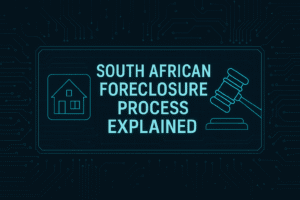What this blog is about:
The Impact of divorce on your property status and financial implications
How divorce can affect your homeownership status in South Africa: Divorce is a difficult process. The emotional challenges are well documented, as are the legal procedures, but one area that sometimes goes unconsidered is the financial implications of divorce. The impact of divorce on your property status and financial implication can be drastic, so it is important to explore these issues so that you know what to expect for the future.
When you’re going through a divorce, it’s hard to know if you can afford to keep your home. It’s even harder when you have children and want to stay in the same neighborhood where they have grown up. You may have had a life-long dream of living somewhere else, but everything you knew has changed.
We understand that there is no one-size-fits-all solution, which is why we work with each client individually to find the right path forward for their unique situation. We’ll help you navigate the process of keeping your home or real estate whilst recovering from divorce, including:
Unlocking equity from your real estate to address financial needs .
Assisting you in maximizing your proceeds from the sale of your home or real estate.
You may have heard that divorce is bad for your financial health, but it’s also true that divorce can be good. You will have to pay a lot of money to get divorced, but once you’re done paying, you’ll be able to keep more of the assets that were previously jointly owned by both partners. Divorce lawyers know how to work with these complicated issues so they can help their clients get the best results possible.

Divorces can have a significant impact on your children’s futures.
When you divorce, you’re not only changing your own future; you’re also altering the trajectory of your children’s lives. If a parent is cohabitating with their new partner after a divorce, this can have an impact on the amount of time each parent has for their children.
Also, if one or both parents remarry after their divorce, it could create friction between them and their former partners over custody issues.
Financial burden of divorce.
The financial burden of divorce can be substantial.
If you own property, a divorce court may order:
- division of property between the two of you;
- payment or reimbursement for your share of the equity in your home; and/or
- an award for alimony (spousal maintenance).
Debt
At the time of divorce, you will need to consider what debts are your responsibility, and which ones should be shared with your spouse. For example, if you purchased a car together during the marriage then it is considered community property and both parties are responsible for paying back the debt. If one party wants to keep the car after separation, they may have to pay off the loan individually or refinance it at their own expense. In some cases when there has been domestic abuse in a relationship, a court may order that all joint debts be paid by one party if they cannot afford them on their own budget. We can assist you in consolidating your debt and debt negotiation if you own a property.

Financial hardship due to divorce.
It’s important to note that a financial hardship is not an immediate result of divorce. Rather, it’s the result of a change in income due to divorce. If your ex-spouse is the primary source of your family’s income, you may be experiencing financial hardship because your salary has changed and you’re now tasked with supporting yourself.
If you’ve been through divorce, you know how challenging it can be to adjust to suddenly being single and responsible for yourself. You’re not alone in this struggle—many people experience some amount of financial hardship after getting divorced or separating from their partner.
Consider the repossession of your home.
If you own a home with your spouse, it’s likely that you will have to consider the repossession of your home. You can still live in it as long as both parties agree to do so.
However, if one party wants out and the other does not, there are several legal options available:
- The couple can rent out the house for an agreed upon amount each month. The money from these payments will be used towards paying off any existing mortgage loans until they are paid off completely or reduced to their original value.
- One party could get a personal loan against their portion of ownership in order to cover all bills associated with maintenance fees (e.g., utilities), taxes and insurance premiums while living somewhere else until they decide whether or not they want more time together before making another move forward with divorce proceedings within Alberta family law courts.”
Other costs in a traumatic time.
While you may have spent a lot of money on legal fees when you went through your divorce, there are other costs that don’t appear on your monthly budget or as line items on your credit card bills. These can range from simple things like getting new furniture or clothes after the divorce, to more substantial financial obligations such as paying for counseling or therapy sessions. There may be additional expenses associated with looking for another place to live or moving yourself and your kids out of the house where you once lived with your spouse, who might still be living there even if he/she isn’t paying rent anymore because they’re still taking care of their responsibilities under the divorce agreement (e.g., child custody). In some cases, even if both parties agree not to get back together at any point in time, it’s likely that one person feels more negative about this decision than others do—and these feelings can take years before they fade away completely; thus making it necessary for both spouses’ mental health during this transition period (which could last several months).
A helpful solution for you and your children’s future.
In the event that you and your spouse have been unable to reach an agreement, it is advisable to seek legal advice. Ensure that the best interests of your children are protected.
As a parent, it is important for you to understand the financial implications of divorce on your property status and how this will affect both you and your children in the future.
If you are undergoing a divorce, it is important to be aware of these five financial implications. It could potentially have an impact on the life that you had envisioned for yourself and your children after the divorce is finalized.
It is important to be aware of these five financial implications which could potentially have an impact on the life that you had envisioned for yourself and your children after the divorce is finalized.
First and foremost, if you are going through a divorce, then one of your primary concerns should be providing a stable financial environment for yourself and your children. This means allowing them to have access to whatever resources they need. For example, if they want to go away to college or pursue any other opportunities that require financial assistance, then this cost should not fall on either parent alone but rather be shared between both parties so as not to create further strain on any individual’s income source or budget. It’s also crucial that each party understands how much money he/she has coming in during this time so as not to incur unnecessary debt which could prove devastating later down the road when looking back at how things were handled during this transition period in their lives while also trying their best not impact anyone else negatively (i.e., ex-spouses).
Conclusion
How divorce can affect your homeownership status in South Africa:
Divorce is a traumatic experience for everyone involved, and it can be even more challenging financially. If you are going through a divorce and need help with your property in order to be able to keep living in your home during the process and deal with debt, contact us!



